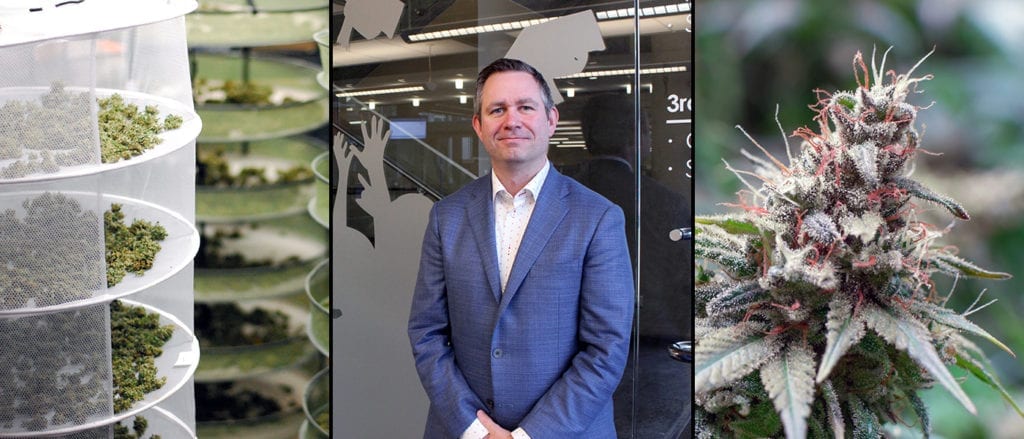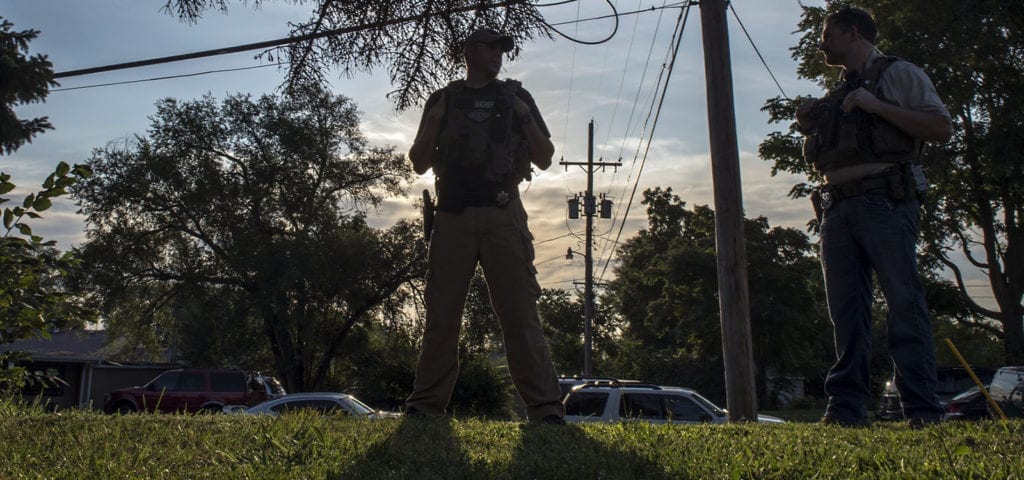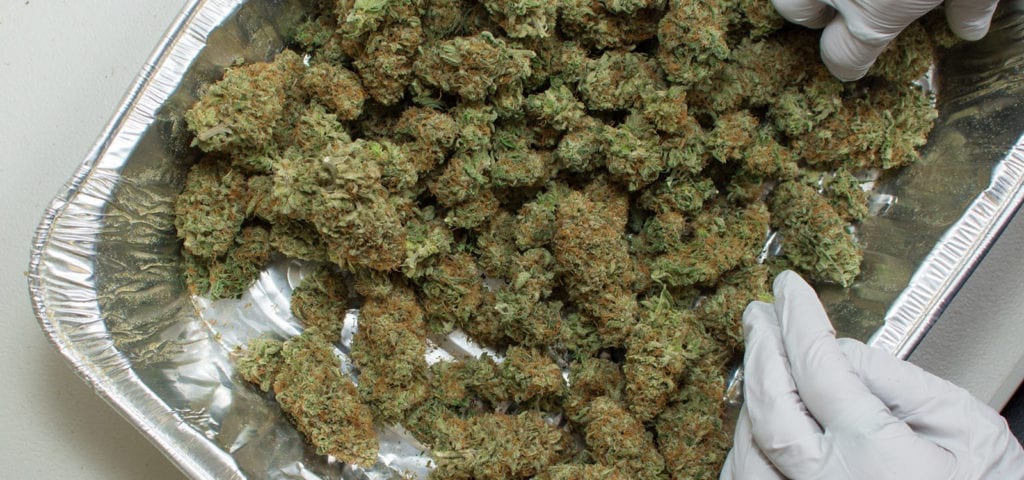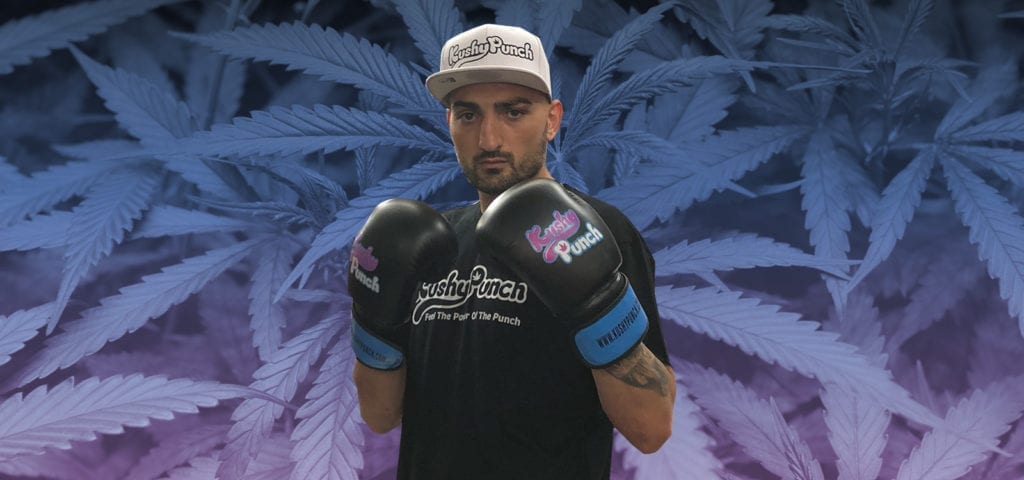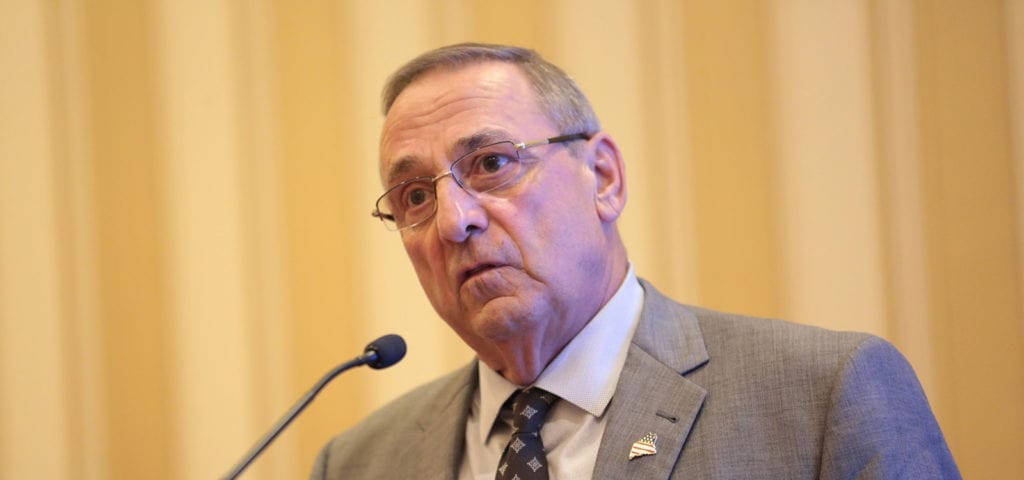Ryan Smith is the CEO and co-founder of LeafLink, a business-to-business digital marketplace for cannabis retailers, producers, and processors to trade wholesale cannabis products.
Ryan recently joined our podcast host TG Branfalt for an interview about LeafLink’s founding, the success they have found so far, and the difficulties and goals that still lie ahead. He also shares his thoughts about the state of the industry (including which states he is eyeing for future expansion), which professional qualities he looks for when hiring for Leaflink, and more!
You can listen to the interview via the player below or scroll further down to read a full transcript of this week’s Ganjapreneur.com podcast episode.
Listen to the interview:
Read the transcript:
TG Branfalt: Hey there, I’m your host TG Branfalt and you are listening to the Ganjapreneur.com Podcast where we try to bring you actionable information and normalize cannabis through the stories of ganjapreneurs, activists and industry stakeholders. Today I’m joined by Ryan Smith, he’s the CEO and co-founder of LeafLink, which provides a wholesale management platform for the cannabis industry.
In 2016 Smith was included in the Forbes’ 30 Under 30 list. So he doesn’t really need my introduction. But how you doing this afternoon Ryan?
Ryan Smith: Great, thanks TG for having me and Leaflink on the podcast today.
TG Branfalt: I’m really excited in the way that we have a lot to cover. Before we get into the nuts and bolts man tell me about yourself. What’s your background? How did you end up in the cannabis space?
Ryan Smith: I grew up in New York City. In Manhattan and always on the east coast, so I’m just going east coast and started an investor relationship management platform for real estate companies back in college as an undergrad. We exited that to a public company in 2014. And then I’ve always been selling stuff on eBay in my free time. So my parents had a joke that if things would go missing in the house they’re probably in Ryan’s PayPal account.
So I always loved marketplace technology and there’s a really unique opportunity to empower companies in the cannabis industry because it’s so new, it’s defining itself everyday. That if we can build tech in from the very beginning like what does that mean for industry? It’s gonna be and it’s getting to be as big as it is. So that’s when Zack, my co-founder Zack and I connected and began just doing research and hearing what people needed to help grow their businesses.
That’s what gave birth to Leaflink.
TG Branfalt: So why don’t you describe to the listeners what Leaflink is. What sets it apart tech wise from other competitors?
Ryan Smith: So Leaflink is a wholesale B to B marketplace. We have tools that support those business to business transactions and then we enable and empower companies to buy the products they normally buy faster. And then also find new ones because as you know there’s a new company every morning and night in this industry and to keep track of those and their prices and admission is difficult.
So Leaflink is, there’s really two differences. The first is our team. So we brought together a mixture of people that have incredible cannabis experience, have been working in retail locations. Have worked for distributors, have worked for brands. And then we’ve also married those skillsets with people that would never be in the cannabis industry if they weren’t at Leaflink. Incredible engineers with great experience working at companies like Yelp or other tech leaders that you’d recognize.
So those skillsets together is a clear advantage. The second is our community. So we have over 2000 retailers and almost 500 brands now that are active on the platform everyday in six states. And so what we are doing, we’ve always said in the very beginning our focus is to create a new standard in this industry. Define it from the beginning and how people not only communicate with each other but also transact wholesale with each other. So that entire acceptance product fit community that we built we think is the second clear differentiator that makes us powerful and in a good position to continue to grow. Which we still have a lot of growth to do.
TG Branfalt: So you mentioned people first. What do you look for in bringing in this talent? So you’d necessarily find people who weren’t active in this space. What qualities do you look for in people that you bring in?
Ryan Smith: Execution, professionalism I think are two of the biggest ones. We’ve seen … you know everyone says in this industry one year is like seven years, the same things happen, just move so quickly. And if you even look at articles of tech companies two or three years ago, some of which are not even around anymore. There’s this whole branding and cultural story around, “Oh you know this is a tech company for marijuana. People get high there at work and they have a dab room.”
And for us and Zack and I have always thought that this industry deserves just as great software, just as incredible and skilled people working on their teams. And they deserve that same standard from us so from the very beginning we want to bring in people that if you have industry experience, amazing, but we do see this second step, this new level of maturity the whole industry’s entering and we want to do everything we can to further that because that’s how this industry goes as mainstream and becomes commercialized and just everywhere.
There just aren’t enough people that have cannabis experience to fill all the positions and so bringing in talented skilled people to further that goal is to me always been super focused on and think for ourselves. As a tech company looking for incredibly professional and skilled people that execute get stuff done. Facing the cannabis industry.
TG Branfalt: Do people that you might approach, do they ever give you the side eye because you’re in the cannabis industry? Is that stigma still persistent?
Ryan Smith: I almost laugh, because I would laugh at someone if they have that. But what we’ve seen so much more now, we’ve gone through three rounds of funding, is there is such a deep interest in companies that, either they’re institutional capital looking for opportunities or they’re just … some of the people we have one of our first angel investors was a teacher at a Catholic school.
One of friends and family, wrote a small check but albeit a check, and there’s this openness that we’re seeing now that that look doesn’t happen really as much as we think anymore. And part of what we were just talking about before, and the things that you’re seeing, some of the people that you’ve been having this podcast before, that next level of professionalism is coming to this space and it’s becoming as it should be treated as though it’s any other. With the same everything that people take for granted in other industries.
So it doesn’t happen as often as it does and if it does happen it’s clearly not a good person for us to be speaking with because they have a clearly antiquated way of seeing reality.
TG Branfalt: So you’d mentioned successful fundraising round. What has led to that success, especially in this era of uncertainty given federal policy?
Ryan Smith: Startups are always risky. They’re whatever, 80% of them fail. When you think about startups in this industry, that’s a startup itself, it’s even crazier. And I think a lot of people in this space aren’t used to it and they’re looking at deals that are … to name half a dozen companies that get a lot of press, seem really exciting, seemingly say the right things. But then the truth shakes out, who is getting stuff done, who’s moving forward, who’s achieving their goals, surpassing their goals and who’s just talking a lot.
And what we’ve built at Leaflink and what we’re always gonna continue to push ourselves to build is a company that does deliver and does complete the things that we saw and promise to our clients, the community, to our investors who our team that we’re gonna do. And then it really goes a long way. So if you can create at some level … and by the way there’s a ton of risk and we are still a startup and have a lot to do. But when you begin to mitigate some of that risk by doing what you said you were gonna do six months ago and maybe even doing a better job with it you begin to build that trust with people.
And that’s really what we’ve done and at a very high level.
TG Branfalt: So you said earlier operating in six states. And as you said this industry’s moving at a breakneck pace. We see everyday another potential medical program. You see states like where I’m at in Vermont and these gray markets that start to emerge. Which obviously isn’t a market that you would operate in because there’s really no infrastructure. But how do you identify which markets to enter and which ones not to enter?
Ryan Smith: So you’re right that Vermont is not a market for us right now. There is not gonna be as far as we know any retail locations or commercialized brands with CPGI out there, and packaged consumer goods that are gonna be selling. But what we do think … but that’s positive, it’s still positive right, it’s the right direction, it’s positive momentum for people that have become more familiar and see how the industry’s growing. See the potential that’s there.
And then maybe two or three years in a row, it advances and matures in a way that will become interesting to us, for us at Leaflink though the markets that make the most sense and the first market that we launched in … usually maybe something similar to the Colorado regulatory design. So usually states start with vertical integration, you have to own the land where it’s grown. The factory where it’s made, the store where it’s sold.
And then more licenses are given out, people begin to be allowed to specialize. Who’s an amazing retailer, who’s a rock star brand, who can do an incredible job with logistics? And then people begin to specialize in just that thing. And those are markets that, the ones that are not vertically integrated. So for us it doesn’t really matter if it’s medical or recreational, what matters more that there’s a free market with a licensing structure that let’s companies do one thing very well.
And then they can all connect to the community on Leaflink and do deals with each other. But those are the ones that we target the most. And the States that we’re live in right now are, first it was Colorado, then Washington, then Oregon, California and Nevada and Arizona. So Arizona being an example that’s medical but companies are allowed to specialize, it’s not vertically integrated and it’s been a great tip for us there so far.
TG Branfalt: And you’d mentioned brands, and man, I can’t tell you how many emails I get of brands. Then a few weeks later they’re gone. So how do you identify the brands that you guys are gonna offer?
Ryan Smith: We’ve been trying, and this is something we can definitely and are always trying to improve. The qualifying participants and members of Leaflink’s community is challenging. Because in certain states it could be let’s say if the state only has 70 retail locations, if they’re in 50 that’s amazing, they have great market penetration, they’re clearly a company that’s doing business, they’re fit. But then in some other states if you have only 25 or 30 dispensaries or retailers in your sales book you’re just getting started.
And so we see a lot companies come out really loud, they wanna get on Leaflink, they think that they’re gonna put their stuff up on our platform. They may not have a sales team, they may not even have a finished product or an advertising strategy or really any clients and they expect that magically, it’s cannabis, everyone’s making so much money and we’re gonna do a bunch of sales and here we go, eight figures of revenue. And then it doesn’t happen.
And then they kind of teeter out. And so it’s, we’re trying to be as objective as we can when we qualify leads and prospect. But it’s tough and there’s a level of subjectivity to just talking to the other side of the marketplace, which retailers are excited about certain brands, which purchasing managers want to buy and sample certain items. It’s tough and it’s changing quickly.
TG Branfalt: So what trends are you seeing? I’ve seen a lot about the plummet of flower sales while concentrates are taking over the market. I’ve heard the same thing about edibles that flowers dying and that whole thing. What trends are you seeing in terms of product? Is this flower dying narrative accurate?
Ryan Smith: Of course not. It is, I’d say it is as a business that anyone can access. But of course it’s not as the key raw ingredient. There will always be a market for flower but the people that have the ability to grow it … so let’s say two or three years ago you and I could get together and have a 15, 20000 sq ft. facility grow loose flower and sell it and that would be a good business. But what we’re seeing is that that’s becoming increasingly more difficult as the price continues to drop, even in Oregon right now. It’s just rock bottom prices.
And so what we think is gonna happen and we’re seeing more of this is there’s gonna be massive operations at scale, high volume production facilities that will be able to make money but only because they’re moving such a high amount of product at a very tight margin, kind of like a paper company. That will still be in business but what we’re seeing, the reason why concentrates are exploding is because people that were previously growing flower can’t make real money on flower so they turn to a concentrate, brand it, put it in a package.
And then there’s usually a higher margin on that. And our bet at Leaflink and what we’ve seen happen, what we see happening all of these states as they mature is that the edibles packaged branded goods are clearly the future. There’s just all of these new companies that are starting in the space need a mission, need a brand, need something that a buyer and a consumer can relate to and can understand.
And it’s hard for most demographics to understand the differences between all the different strains. But it’s easier to understand a cream that I’ve seen before that looks like it’s made from veno or something similar. And buy that, have that connection. So I think brands are the future, flower will always have its place. But raw flower will continue to drop in pricing as we’re seeing in every single market now.
TG Branfalt: That’s really really interesting stuff man. I want to talk to you a bit more about what we’re seeing on a federal level. But before we do that we gotta take a break, this is Ganjapreneur.com Podcast I’m TJ Branfalt.
If you are looking for a job in the rapidly growing and highly competitive cannabis industry, Ganjapreneur.com is the place to look. Visit the Ganjapreneur job board today to browse current openings with cannabis companies throughout the United States. From entry-level budtender positions to executive level career opportunities, you can also create a profile and upload your resume to be discovered by cannabis recruiters. Visit our job board at jobs.ganjapreneur.com to create your profile today.
If you are a business owner you can post your job openings for as little as $25 on our job board. To reach the largest and most engaged audience of cannabis professionals on the web. Companies who are listed in the Ganjapreneur business directory are eligible for free job listings. If you are already signed up contact us today via the website or send us an email at grow@ganjapreneur.com to activate your unique coupon.
TG Branfalt: Hey there welcome back, this is the Ganjapreneur.com Podcast. I’m your host TG Branfalt here with Ryan Smith CEO and co-founder of Leaflink. Super super smart guy, really really stoked to have you on the show, man.
So in a December 2016 Marijuna Business Daily article you said that you were in the wait and see camp regarding Trump’s cannabis policy. On the campaign trail he had said that it was a state’s rights decision. Now he’s saying that all drug dealers should be murdered. That was more than a year before the Cole Memo was rescinded by Jeff Sessions. How do you feel now more than a year later about this administration as it relates to cannabis policy?
Are you still in that wait and see camp?
Ryan Smith: A lot of feelings for sure about what’s happening in DC but I think we are still in a wait and see. If you look at what’s changed, no new laws have been enacted at a federal level. No new laws have changed. There’s been a press conference and the rescinding of the Cole Memo which wasn’t a law either. And it was really just a guidance from the federal agency to each of the state district attorneys to give them guidance.
And the response that we’ve seen I think even since that announcement was made by Sessions is the federal government is beginning to force people to make a decision. So immediately after Jeff Sessions had that Cole rescinding action that he did, Vermont and New Hampshire come online. And then if you’re gonna force people to make a decision on legalization we know the vast majority of people regardless of party, regardless of demographic, regardless of territory are in favor of legalizing marijuana. And that’s just in the way we continue to move. So I think there hasn’t been any federal changes for us to react to really and if there are then we will think hard about those.
We want to be compliant, we spend a ton of time at Leaflink understanding and with lawyers to have a good comprehension of what is developing compliance wise, regulatory wise in each state. And we’ll do the same once there is something to follow and guidelines to go through by the federal government.
It just seems like there is so much changing so quickly. And until there’s a real announcement or a real enforcement action not much for us to really do right now other than keep the pace and continue the momentum that we have in building our company. And the 30 people that we have on staff that work so hard everyday to make Leaflink real.
TG Branfalt: So what do you think then would happen if they were to start cracking down? You operate in six states so you have a really good look at a large portion of this market. What ramifications would that have on the ground literally to stakeholders now?
Ryan Smith: Fear. I think that would be to me the MO behind any kind of enforcement action from the federal level. It’s just not … we’re a technology company, we don’t touch the product, we don’t touch the money. We’re just a software provider for the industry. But if something like that happened it would definitely spook some investors, but then you have other people that are running companies too, brands that are in multiple states that are employing hundreds of people, retail locations that have patients that rely on them every single day.
People that are really … this is a part of their life, they’re super passionate about it, it’s more than just a living. And I don’t think that’s gonna change. So the lives will change of anyone that the enforcement acts against of course, but for the whole market, to take something down that’s this large and growing faster than almost any other industry, really hard to do. I think fear would be the number one thing. Maybe would dry up capital coming into the space from more institutional traditionally minded investors. But the long term I think the die’s already been cast on the potential here. And just general societal acceptance.
TG Branfalt: We can hope at this point, but sometimes I have no idea what’s going on in DC most of the time, sometimes. So looking into your crystal ball, we got Maine, that’s pretty close, there might be some setbacks because of what page and some of the lawmakers there who really want to push it back. Massachusetts is still set on that July 1st date. We could be looking at social use in Alaska.
So there’s changes happening within the market that already exists and some policy changes that are the result of 2016 referendum. In your opinion looking through a crystal ball which states do you think might be next to turn green?
Ryan Smith: So I can say which ones we’re most excited about that fit for Leaflink. I think Michigan and New Jersey this year are really exciting. Very populous states, obviously not quite the size of California which is what everyone is regularly talking about. I’m actually calling from LA this week. Those two states are most interesting to me because what has, if you look at a map, the whole west coast is in line.
They’re legalized, challenges of course but industry booming. You look at the west coast, that’s what that was for. On the east coast, there are states that have legalized, there are really not super active market or they’re in this weird in between, putting their foot in the water. I think as soon as Massachusetts starts opening up some doors, New Jersey particularly being right next to New York.
Cuomo and New York already put together a commission to give him a report on the effect of legalizing marijuana because they know all of these super populous border states to New Jersey to Michigan, Michigan being in the middle, New Jersey being obviously in the east coast, it will create this domino effect I think. So those are the ones that we’re most excited about because when you have people in New York going to Hoboken to buy marijuana, New York state’s gonna say this is ridiculous, we should have the same accessibility for patients and buyers here.
And then that state turns. Some of the states that we’re looking at too, obviously Pennsylvania, Illinois, Alaska you mentioned. And Ohio. There’s a few other states that we’re looking at but our goal at Leaflink is to open up … we’re in six states now so to be in 15 by the end of the year. Some of them are very much Q3 Q4, but the Michigan and Pennsylvania really seem to be before the summer activity for us to launch there. So we’re keeping our eye on those.
TG Branfalt: I covered the New York state legislature for several years before I started writing about cannabis. One of the things I’ve always said is Cuomo won’t let this happen on his watch for a lot of different reasons. So as somebody else from New York did you get that same feeling before he put together that commission? Do you think that he will actually allow this to happen? As a centrist democrat?
Ryan Smith: All of these elected officials … so Cuomo was so incredibly against it. His father being Rockefeller drug New York days, there’s that obviously trickles down. And then all these elected officials are realizing even though Cuomo is so against legalization and even medical usage several years ago, it’s clearly a losing position. And every election it seems like this issue’s gonna be coming up more and more and they are not blind to that. The midterm election I think it’s gonna be a huge issue.
People are gonna talk about it all the time, same with the current governor of New Jersey promised first hundred days. I don’t know if that’s gonna happen but it was a point to discuss and now will continue to build up steam. So I would have said two years ago Cuomo probably wants to run for president or some other more senior office. So this issue is not a done deal and if there’s a majority of people that are in support of it, and now that’s beginning to happen, it would be ill advised for him not to at least explore it.
So him having a commission is perfect. He could say I set the things in motion for us to look at it as a state. Maybe won’t, nothing significant will happen in New York while he’s in office but he could always go back and say but I began it. These things take time. But he could also I never changed anything, I didn’t make anything open up.
So he’s playing both sides but even that’s a positive momentum. Before he wasn’t trying to play both sides. It was just against us.
TG Branfalt: It’s really frustrating as somebody who went to school in Albany and very liberal part of the state knowing that the rural part of the state is just hemorrhaging money, there’s no jobs. This is something that, that farmland, that’s how you use that farmland. Even a proper hemp program for that matter. So it’s really interesting for me to watch in my home state, or my ex-home state I guess, inch towards it but knowing what I know about Cuomo and having covered him for so long.
I want to talk to you about your personal success but before we do that we gotta take a break, this is Ganjapreneur.com Podcast I’m TG Branfalt.
At Ganjapreneur we have heard from dozens of cannabis business owners who have encountered the issue of canna-bias which is when a mainstream business whether a landlord, bank or some other provider of vital business services refuses to do business with them simply because of their association with cannabis. We have even heard stories of businesses being unable to provide health and life insurance for their employees because the insurance providers were too afraid to work with them.
We believe that this fear is totally unreasonable and that cannabis business owners deserve access to the same services and resources that other businesses are afforded. That they should be able to hire consultation to help them follow the letter of the law in their business endeavors. And that they should be able to provide employee benefits without needing to compromise on the quality of coverage they can offer.
This is why we created the Ganjapreneur.com business service directory, a resource for cannabis professionals to find and connect with service providers who are cannabis friendly and who are actively seeking cannabis industry clients. If you’re considering hiring a business consultant, lawyer, accountant, web designer or any other ancillary service for us business go to ganjapreneur.com/businesses to browse hundreds of agencies, firms, and organizations who support cannabis legalization and who want to help you grow your business.
With so many options to choose from in each service category, you will be able to browse company profiles and do research on multiple companies in advance so you can find the provider who is the best fit for your particular need. Our business service directory is intended to be a useful and well-maintained resource which is why we individually vet each listing that is submitted. If you are a business service provider who wants to work with cannabis clients you may be a good fit for our service directory.
Go to ganjapreneur.com/businesses to create your profile and start connecting with cannabis entrepreneurs today.
TG Branfalt: Hey welcome back to the ganjapreneur.com podcast I’m your host TG Branfalt here with Ryan Smith, CEO and co founder of Leaflink. So what, man, do you credit your personal success to, such as being named to Forbes as one of the 30 Under 30 in the emerging tech space. That’s super cool man. What do you credit that to?
Ryan Smith: I forget to say execution again. I have trouble with the question of being, crediting success because that implies that we have some success. In my mind we’re just getting started and haven’t really accomplished all that much yet. There’s way more in front of us than behind. So I appreciate the compliment and everything but I don’t feel that successful. I have way more to do before I can sit back and get comfy that way.
TG Branfalt: But when Forbes reaches out to you and tells you this what’s going through your mind? Did you think maybe at that point like you’re closer to making it?
Ryan Smith: The first thing that crossed my mind is, “Great I can now be in a group of other people that are thinking similarly or trying to do challenging and exciting things and seeing what happens from those relationships.” It is cool to be in those lists because there’s not very many, aside from taking your company public or having some great acquisition, awards for entrepreneurs. So it’s definitely an honor to be on it and I’m very excited about it. I was excited too for Leaflink and the company to be on, the first cannabis firm, cannabis facing firm to be on that list, it’s huge for mainstreaming, just to have everyone thinks about this industry.
So we’re happy about it and obviously honored to be on that list and the fast company list we were on last week. But still so much more ahead of us.
TG Branfalt: So what advice do you have for entrepreneurs looking to enter this space? From a tech perspective especially?
Ryan Smith: Meet more people. So everyone knows that the industry is … everyone knows it’s a hot industry, that it’s real, that it’s growing very quickly. But to go to states where it’s legal, to spend time with the incredible entrepreneurs there that are building these amazing companies and realize that there are serious challenges that are presented to all business owners but particularly in this space there are so many opportunities to serve them with great technology, with great services, with great solutions.
And so if you want to get into this space I do again work … what Zack and I did we flew out to Colorado, we emailed a bunch of people and whoever agreed to meet with us, we sat down with them and then built a relationship and we were helping people pack boxes and going on sales calls just to get what they do and understand the industry. So really if you want to know more, dive in and meet more people really. In person meet more people.
TG Branfalt: How nerve-wracking is that man? I don’t go to conferences, I’m a very very private person. So how nerve-wracking is it being a startup and reaching out to people cold calling them to get your opinion on what you’re selling? What goes through your head?
Ryan Smith: Two things. First is if I keep my promise or my intention behind meeting them, their life should be a little bit better from the solution that we’ve created. And the second is you gotta rev yourself up. So sometimes I’ll go into a meeting, my first thought before sitting down is, “This is gonna be an awesome get together, we’re gonna learn a bunch of things.” And the other side of this meeting … you can either go in being nervous or you can say, “You know what? The other side of this meeting is gonna one day say they had a meeting with Leaflink when we were two people or we were three people.” And there was like, “Naw, no way.”
And whether or not that’s the case you need to rev yourself up. So that’s just one of the tricks that I do. I know our team does. We want to help people but you also need to be excited to put yourself out there because it’s the only way you get things done.
TG Branfalt: This has been really a super cool conversation man. I’m really stoked that you could take the time out to join me on the show. Where can people find out more about you, where can they find out more about Leaflink?
Ryan Smith: Yeah thank you by the way TG for having us. Always love Ganjapreneur and glad we could chat about all these things. If you want to find out more about Leaflink you can visit us at Leaflink.com. If you’re a retail dispensary we’d love to have you on the community with the 2000 others that are really active in the six states that we’re currently live in, much more to come. And if you’re a brand, same thing, go to Leaflink.com, if you’re looking for work, we’re out hiring actively after our most recent raise.
So send resumes to jobs@Leaflink.com. Otherwise happy to walk you guys through any kind of demo if you send an email to sales@Leaflink.com and set it up there.
TG Branfalt: Again man, thank you so much. It’s really nice to chat with you. Pick your brain a whole lot. A fellow New Yorker too, I don’t get too many of those on this show. Congratulations. You’re a humble guy obviously, but congratulations on all your personal success this far as well as success of Leaflink man, this is super cool stuff.
Ryan Smith: Thank you for … appreciate all those kind words. Happy to chat more another time.
TG Branfalt: Looking forward to it man. You can find more episodes of the Ganjapreneur.com Podcast in the podcast section of Ganjapreneur.com and in the Apple iTunes store. On the Ganjapreneur.com website you will find the latest cannabis news and cannabis jobs updated daily along with transcripts of this podcast. You can also download the Ganjapreneur.com app in iTunes and Google Play. This episode was engineered by True Media House, I’ve been your host TG Branfalt.
